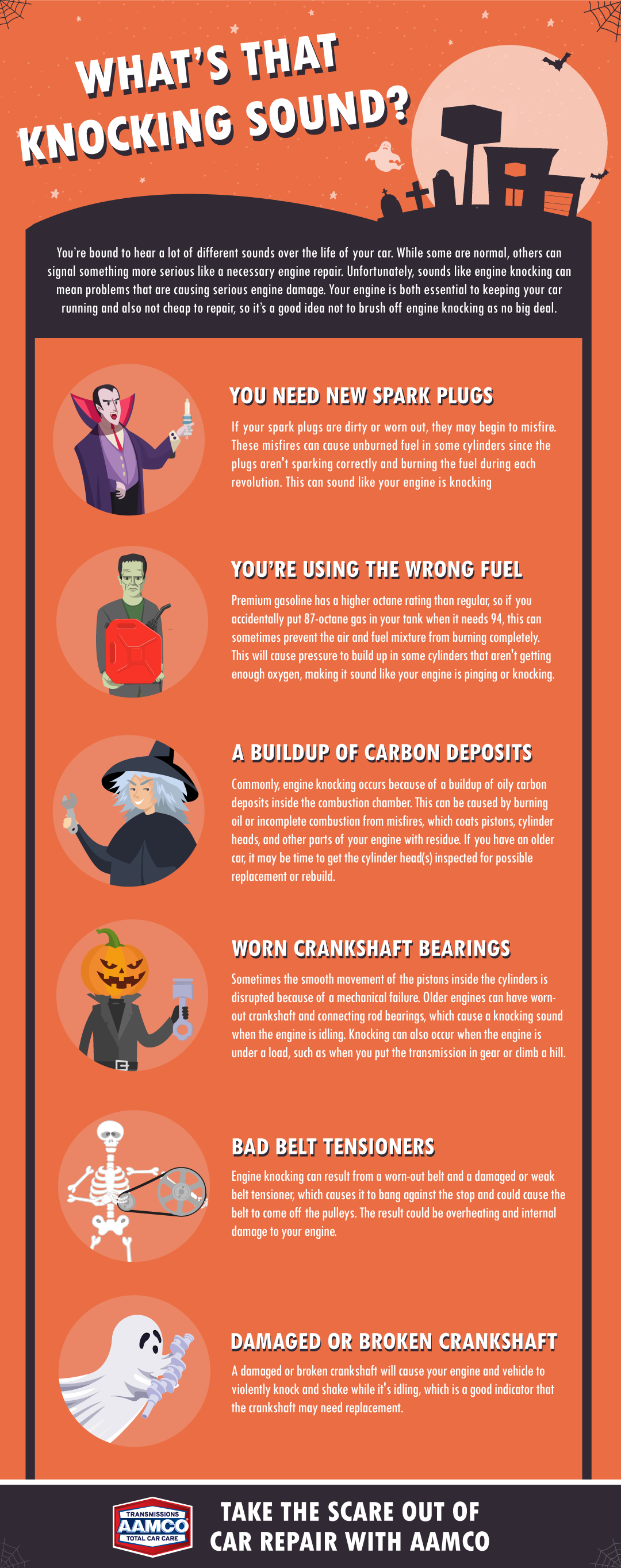What To Do When Engine Sounds Give You the Chills
How to keep that dreadful engine knocking from scaring away your autumn fun!
AAMCO | 10/05/2021
Your vehicle's engine is an incredible piece of modern machinery. From the moment you turn your key in the ignition, its intricate parts are working in harmony to deliver power with precision.
Is My Car Possessed?
When the fall weather starts to turn cold, you may notice unfamiliar sounds when your engine is idling. Those mysterious knocking or rapping sounds can give your vehicle a haunting presence. But fear not! There are several reasons your engine makes those noises, and none of them deal with ghosts or ghouls.
8 Reasons Vehicle Engines Go Bump in the Night
If you begin to notice a knocking, rocking, or rattling happening from your engine, it may be due to one of the following:
1. Low oil level
One of the first things to do if your engine is noisy is check your oil level. A low oil level can cause various problems, such as bearing and part damage. It can also cause hydraulic lifters and tensioners to collapse and start clicking, not opening the valves or keeping the timing chains tensioned properly. This will cause the engine to misfire and overheat, where metal-to-metal damage can occur to bearings and other components.
Additionally, the incorrect oil can also cause problems. Oil viscosity needs to be correct to ensure proper flow. The wrong viscosity oil causes lubrication issues during very cold conditions.
2. Low coolant
If your engine begins to run out of coolant, the engine will run hot and begin to knock and ping. Low coolant results from either an external leak from a hose, a damaged radiator, or an internal leak from a head gasket or intake gasket. Coolant in the engine will cause extensive damage to the bearings by contaminating and diluting the oil used to lubricate the engine. Overheating may cause the engine to warp aluminum cylinder heads and dislodged valve seats, causing severe damage. If you see steam or the temperature gauge rises rapidly, stop your vehicle immediately and turn off the engine. The next step is to have a professional technician inspect the vehicle.
Also, the lack of the proper coolant/antifreeze mix will cause your coolant to freeze in very cold conditions. Frozen coolant can cause the block or cylinder heads to crack due to water expansion. This type of damage can be unrepairable with engine replacement as the only possible repair.
3. New Spark Plugs Are Needed
If your spark plugs are dirty or worn out, they may begin to misfire. These misfires can cause unburned fuel in some cylinders since the plugs aren't sparking correctly and burning the fuel during each revolution. This can sound like your engine is knocking.
4. Wrong Fuel
Another common issue with engine knocking is using the wrong type of gasoline. Premium gasoline has a higher octane rating than regular, so if you accidentally put 87-octane gas in your tank when it needs 94, this can sometimes prevent the air and fuel mixture from burning completely. This will cause pressure to build up in some cylinders that aren't getting enough oxygen, making it sound like your engine is pinging or knocking.
5. Buildup of Carbon Deposits
Commonly, engine knocking occurs because of a buildup of oily carbon deposits inside the combustion chamber. This can be caused by burning oil or incomplete combustion from misfires, which coats pistons, cylinder heads, and other parts of your engine with residue. If you have an older car, it may be time to get the cylinder head(s) inspected for possible replacement or rebuild.
6. Worn Crankshaft Bearings
Sometimes the smooth movement of the pistons inside the cylinders is disrupted because of a mechanical failure. Older engines can have worn-out crankshaft and connecting rod bearings, which cause a knocking sound when the engine is idling. Knocking can also occur when the engine is under a load, such as when you put the transmission in gear or climb a hill.
7. Bad Belt and Belt Tensioners
A belt is a rubber band-like device used to transfer power from the engine pulley to various components in your vehicle, such as the water pump, air conditioner, and alternator.
Engine knocking can result from a worn-out belt and a damaged or weak belt tensioner, which causes it to bang against the stop and could cause the belt to come off the pulleys. The result could be overheating and internal damage to your engine.
8. Damaged or Broken Crankshaft
A damaged or broken crankshaft will cause your engine and vehicle to violently knock and shake while it's idling, which is a good indicator that the crankshaft may need replacement.
Knocking That Stops You in Your Tracks
If you hear a knocking sound while driving in any weather, pull off the road as soon as possible to a safe location, and turn the motor off. Next, get your vehicle checked out by a professional technician quickly; if left untreated, the above list of knocking reasons can lead to worse results, even catastrophic engine failure where a complete engine replacement or rebuild is the only solution (now that's spooky!).

Stop by Your Local AAMCO This Halloween for an Inspection!
If you aren't ready for your vehicle to be the star of your local Halloween parade, make sure to stop by your local mechanic to find out what's causing the knocking sound under your hood.
A technician will diagnose the knocking sound, advise you of any needed work, and give you a general idea of how much it will cost.
Your best bet is to go for an early fall check-up before any potential haunting can occur. If any problems need to be fixed, now is the time to do it. Contact us today!



